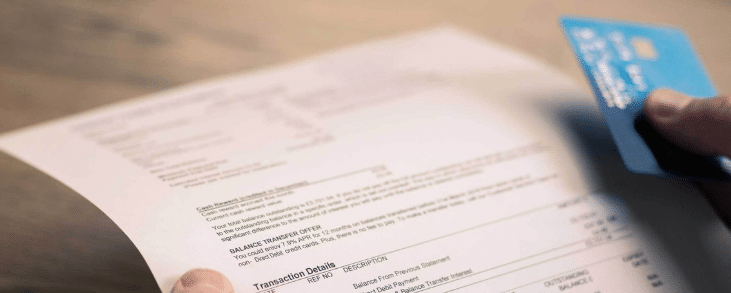Dealing with credit card debt can be crippling. And if you’re looking for relief, you may be wondering if credit card debt forgiveness is possible for you.
Credit card debt forgiveness can be a possibility in certain situations. Understanding when the option is available and how to achieve it can help you break free from crippling debt.
What is credit card debt forgiveness?
Put simply, credit card debt forgiveness is when you are no longer required to pay the full amount you owe. However, while this sounds like a great solution, it generally requires sacrifices from the borrower. There are several ways to have some or all of your credit card debt forgiven.
Do I have to be behind in my monthly payment to my creditors?
Credit card debt forgiveness will not happen if you are current on your bills. There is no incentive for a credit card company to resolve debt you are current on and that you continue to pay monthly or regularly. As a result, if you are not behind on your bills, you likely will not see a reduction in the balance of your debt or forgiveness of your debt from your creditors.
What happens to my credit?
Once you fall behind on your debt for more than a billing cycle or 30 days, your creditor will report that on your credit report. This will be a negative mark on your credit. You can help your credit by paying off your debt or negotiating with your creditors to reduce your credit card balances. Your credit can then improve.
Negotiating a settlement with your creditor
If you’re behind on credit card bills, you may consider negotiating a settlement with your creditor or the debt collectors your creditor has sold your debt to.
You can do this yourself, but negotiating your own debt can be stressful, overwhelming, and time-consuming. You would not want to make a mistake and agree to something you cannot pay or give information to your creditors that they can use against you.
But how can you convince a credit card company to settle? A credit card issuer may agree to a settlement if you’re delinquent on your debt and the creditor feels a settlement is the only way they will recoup any portion of your debt. A settlement may be paid in a lump sum or with a payment plan over a specified amount of time.
But how can you convince a creditor to settle? A creditor may agree to a settlement if you’re delinquent on your debt and the creditor feels a settlement is the only way they will recoup any of your debt. A settlement may be paid in with a lump sum payment or with a payment plan over a specified amount of time. This is all negotiable with your creditor. It is not realistic to expect a creditor to forgive all of the debt. If the debt is legitimate, then the likelihood is that you would receive a small reduction in the remaining balance.
You can also hire a debt settlement professional to help. A debt professional would have knowledge of negotiation strategies and existing relationships with creditors that will help you resolve the debt the right way, help you avoid bankruptcy and make sure the debt is fully resolved.
If you do decide to negotiate on your own, here’s what you should know:
- Call the creditor: Ask to speak to the debt settlement or loss mitigation department. Once you connect with a representative, explain your situation, and propose your offer.
- Be persistent: Creditors rarely agree to a settlement on the first phone call. Don’t be discouraged. Keep calling and trying different negotiation strategies to find a path that works.
- Be polite: You can be firm in your ask, but remember to be polite. This is generally more effective than being harsh.
- Get everything in writing: Make sure you take notes and get any agreements in writing. Your settlement is not binding until you have documentation.
Letting the statute of limitations expire
All credit card debt has a statute of limitations. Once a debt has passed the statute of limitations, the creditor can no longer sue you for the debt. However, if you make any kind of payment that restarts the statute of limitations on the collection of the debt. This approach is not the same kind of credit card forgiveness as debt settlement. You are still technically obligated to pay the debt, but the creditor can no longer take legal action.
The statute of limitations on your debt is determined by the type of debt and the state in which you live. However, you as the borrower are responsible for proving that your debt has passed the statute of limitations. Usually, the date is calculated from the date of your last credit card payment made to the creditor. You will need to know that date to calculate the time.
Filing for bankruptcy
Credit card forgiveness is possible through declaring bankruptcy, but bankruptcy should always be a last resort. Bankruptcy will require a lot of sacrifices and cause disastrous long-term effects on your finances. In Chapter 7 bankruptcy, the court will liquidate your assets to pay off your debts. In Chapter 13, the court will order a repayment plan to pay off your debts. Consider debt settlement, or other alternatives to bankruptcy, to avoid the negative impact of bankruptcy.
Also, in Chapter 13, you will have to submit a plan to the court for repayment of your debts. This means that the debt is not forgiven. In Chapter 7, you will have to qualify for forgiveness through the means test. That test also changes from state to state.
It is wise to avoid bankruptcy so that you do not have issues with your credit because bankruptcy can stay on your credit for seven to 10 years. Bankruptcy can impact your ability to get loans, licenses, and lower interest rates. While it sometimes makes sense to file for bankruptcy, it should not be taken lightly.
Pros of credit card debt forgiveness
Understanding the benefits and drawbacks of credit card debt forgiveness can help you determine whether it’s the right decision for you. Some of the pros include:
- Paying less than you owe: Of course, the major advantage, particularly with debt settlement, is that you will pay a less than the total amount than you owe.
- Lessening the burden: Credit card debt forgiveness will lighten your debt load. This is not only a psychological benefit but can improve your financial situation, including potentially your credit score and debt-to-income ratio.
- Improving your credit: Because you are reducing your balances, debt settlement can improve your credit in the long run.
Cons of credit card debt forgiveness
While the benefits may be obvious, considering the risks is essential. Some of the cons include:
- A mark on your credit report: Any of the options for credit card debt forgiveness can stay on your credit report for an extended period. Debt settlement and Chapter 13 bankruptcy will remain on your credit report for seven years, while Chapter 7 bankruptcy will remain for ten years. However, the effects will diminish with more time and a conscious effort to rebuild your credit.
- Tax consequences: When you pay less than you owe, you may be taxed on the forgiven amount. The IRS considers forgiven debt taxable income, and your lender will issue a 1099-C form to include on your tax return. However, there are exceptions where you may not end up having to pay. You should check with the IRS, your tax preparer, or an accountant who is familiar with the rules surrounding the forgiveness of debt.
- Additional costs: While you’ll be paying less than you owe on your debt, there may be other costs involved in a credit card debt forgiveness program. You may rack up additional late fees if you’re remaining delinquent, or you may be paying a professional to assist you.
The bottom line
Credit card debt forgiveness is possible. However, it’s not a one-size-fits-all solution. It can feel like a gift for those drowning in debt and can’t seem to see another way out. But for those in otherwise good financial standing, the risk may outweigh the reward.
Consider your financial situation and the other debt relief options that may be available to you. Adjusting your budget, using a balance transfer card, or debt consolidation are all paths you may wish to consider. Understanding the ins and outs of credit card debt forgiveness will allow you to make the right decision.
And if you’re struggling with debt and don’t know where to turn, Tayne Law Group, P.C. is here for you. Our team of debt professionals can help you get back on the road to financial freedom. Call us for a free consultation at 866-890-7337 or fill out our short contact form, and we’ll get in touch!







